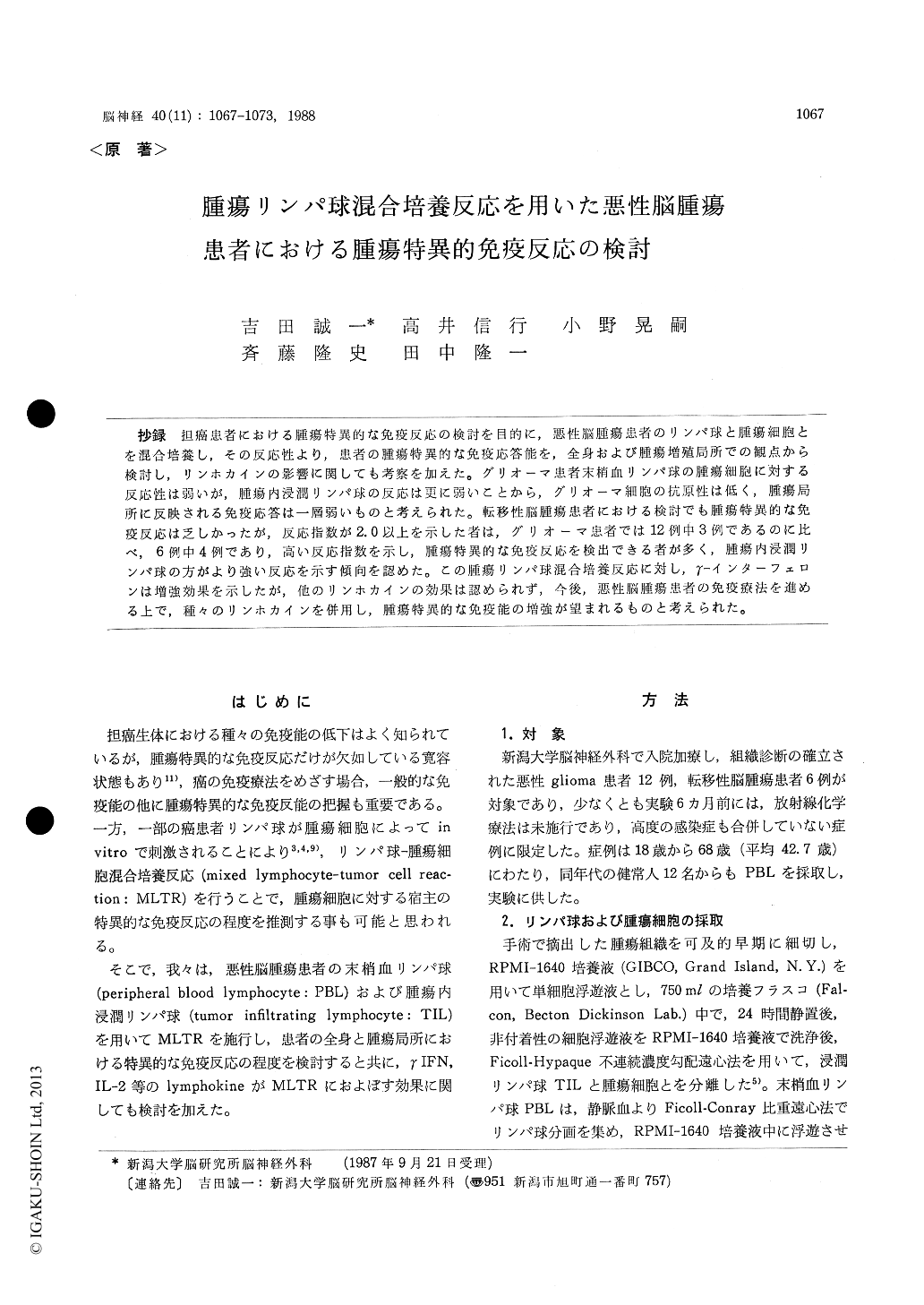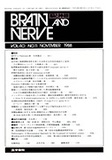Japanese
English
- 有料閲覧
- Abstract 文献概要
- 1ページ目 Look Inside
抄録 担癌患者における腫瘍特異的な免疫反応の検討を目的に,悪性脳腫瘍患者のリンパ球と腫瘍細胞とを混合培養し,その反応性より,患者の腫瘍特異的な免疫応答能を,全身および腫瘍増殖局所での観点から検討し,リンホカインの影響に関しても考察を加えた。グリオーマ患者末梢血リンパ球の腫瘍細胞に対する反応性は弱いが,腫瘍内浸潤リンパ球の反応は更に弱いことから,グリオーマ細胞の抗原性は低く,腫瘍局所に反映される免疫応答は一層弱いものと考えられた。転移性脳腫瘍患者における検討でも腫瘍特異的な免疫反応は乏しかったが,反応指数が2.0以上を示した者は,グリオーマ患者では12例中3例であるのに比べ,6例中4例であり,高い反応指数を示し,腫瘍特異的な免疫反応を検出できる者が多く,腫瘍内浸潤リンパ球の方がより強い反応を示す傾向を認めた。この腫瘍リンパ球混合培養反応に対し,γ-インターフェロンは増強効果を示したが,他のリンホカインの効果は認められず,今後,悪性脳腫瘍患者の免疫療法を進める上で,種々のリンホカインを併用し,腫瘍特異的な免疫能の増強が望まれるものと考えられた。
In considering immunological approaches to treat-ment of the patients with malignant brain tumors, it seems very important to enhance the tumor specific immunity. Then, to ascertain whether tumor specific immune response occurs in these patients with malignant brain tumors, lymphocyte blastogenetic responses to tumor cells were exa-mined in 18 patients with malignant brain tumors. Furthermore, to compare the systemic immuno-logical responses with the local responses in the brain tumor tissues, both peripheral blood lympho-cyte (PBL) and tumor infiltrating lymphocyte (TIL) were used as blastogenetic stimulators to the tumor cells. The PBL from the patients with malignant gliomas showed any postitive blastoge-netic response to their own glioma cells in 7 or 12 cases (about 58%). But, TIL from these patients showed a positive response in the only 3 cases (25%). In 6 cases of metastatic brain tumors, otherwise, their PBL showed any positive blasto-genetic response to their own tumor cells in 4 of 6 cases (about 67%), and their TIL showed any positive blastogenetic responses in these same 4 cases. So, the tumor specific immunological re-sponses may be stronger in the patient with meta-static brain tumors than in the patient with malig-nant gliomas. These immunological responses were, furthermore, more weak in the brain tumor tissues than in the systemic immunity. Then, this lympho-cyte blastogenetic response to tumor cells were compared with other lymphocyte stimulating exami-nation such as rectine or allogenetic lymphocyte stimulation. Our studies revealed that this lym-phocyte blastogenetic response to tumor cells were at lower level compared with rectine such as PHA, PWM, and Con A, or allogenetic lymphocyte stimu-lation. Furthermore, the effects of lymphokinessuch as IL-2, IFN-γ, and OK-432 on this mixed lymphocyte-tumor cell culture response were studied consecutively. As a result, these response were enhanced when these cells were exposed to IFN-r (5000 U). Other lymphokines had no effect on this responses. This methods seemed to be useful to know the tumor specific immune response in these patients. Though these phenomena may indicate an immunological recognition of the tumor cells, it is still unknown whether specific immunological defence reactions occur against the resplastic cells. These our experiences showed that measurementsof the mixed lymphocyte-tumor reaction might be useful in the detection of tumor specific immu-nological response in the patients with malignant brain tumors. In these patients, tumor specific immunological responses were weak especially in the brain tumor tissues. Some treatments may be effective on increasing this response because IFN-y could enhance this response. So, in future, it may be important to increase tumor specific re-sponse by any effective lymphokines.

Copyright © 1988, Igaku-Shoin Ltd. All rights reserved.


